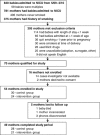Prevention of postpartum smoking relapse in mothers of infants in the neonatal intensive care unit
- PMID: 21836549
- PMCID: PMC3343345
- DOI: 10.1038/jp.2011.106
Prevention of postpartum smoking relapse in mothers of infants in the neonatal intensive care unit
Abstract
Objective: Approximately 40% of women who smoke tobacco quit smoking during pregnancy, yet up to 85% relapse after delivery. Those who resume smoking often do so by 2 to 8 weeks postpartum. Smoking mothers are more than twice as likely to quit breastfeeding by 10 weeks postpartum. The hospitalization of a newborn, while stressful, is an opportunity to emphasize the importance of a smoke-free environment for babies. Supporting maternal-infant bonding may reduce maternal stress and motivate mothers to remain smoke free and continue breastfeeding. The objective of this study was to reduce postpartum smoking relapse and prolong breastfeeding duration during the first 8 weeks postpartum in mothers who quit smoking just before or during pregnancy and have newborns admitted to the Neonatal Intensive Care Unit (NICU).
Study design: This study was an Institutional Review Board-approved prospective randomized clinical trial. After informed consent, mothers of newborns admitted to the NICU were randomized to a control or intervention group. Both groups received weekly encouragement to remain smoke free and routine breastfeeding support. Mothers in the intervention group were also given enhanced support for maternal-infant bonding including information about newborn behaviors, and were encouraged to frequently hold their babies skin-to-skin.
Result: More mothers were smoke free (81 vs 46%, P<0.001) and breastfeeding (86 vs 21%, P<0.001) in the intervention than in the control group at 8 weeks postpartum.
Conclusion: Interventions to support mother-infant bonding during a newborn's hospitalization in the NICU are associated with reduced rates of smoking relapse and prolonged duration of breastfeeding during the first 8 weeks postpartum.
Figures


References
-
- Castles A, Adams EK, Melvin CL, Kelsch C, Boulton ML. Effects of smoking during pregnancy. Five meta-analyses. Am J Prev Med. 1999;16 (3:208–215. - PubMed
-
- Fang WL, Goldstein AO, Butzen AY, Hartsock SA, Hartmann KE, Helton M, et al. Smoking cessation in pregnancy: a review of postpartum relapse prevention strategies. J Am Board Fam Pract. 2004;17 (4:264–275. - PubMed
-
- Colman GJ, Joyce T. Trends in smoking before, during, and after pregnancy in ten states. Am J Prev Med. 2003;24 (1:29–35. - PubMed
-
- Suplee PD. The importance of providing smoking relapse counseling during the postpartum hospitalization. J Obstet Gynecol Neonatal Nurs. 2005;34 (6:703–712. - PubMed
-
- Kaaresen PI, Ronning JA, Ulvund SE, Dahl LB. A randomized, controlled trial of the effectiveness of an early-intervention program in reducing parenting stress after preterm birth. Pediatrics. 2006;118 (1:e9–19. - PubMed
Publication types
MeSH terms
LinkOut - more resources
Full Text Sources
Medical

